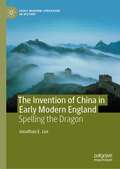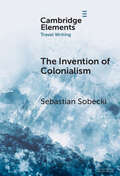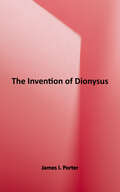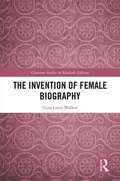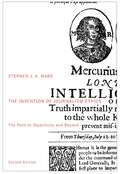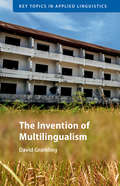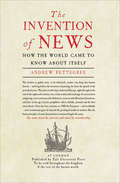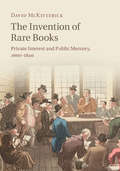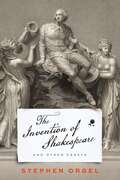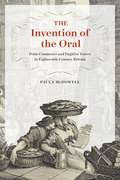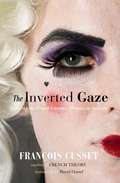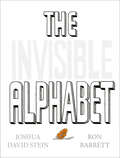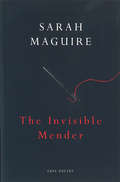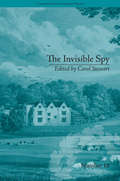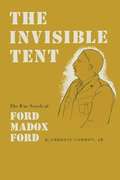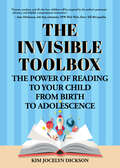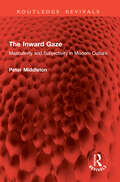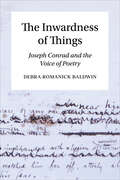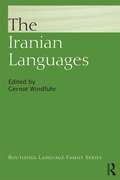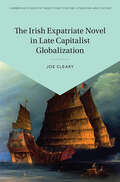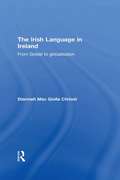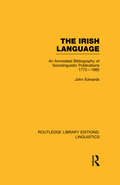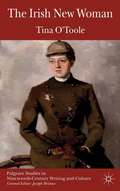- Table View
- List View
The Invention of China in Early Modern England: Spelling the Dragon (Early Modern Literature in History)
by Jonathan E. LuxThe Invention of China in Early Modern England describes how several different English communities became aware of China. It begins by describing how early modern intellectuals used the utopian ideal of China to license all kinds of progressive innovation before chronicling how England’s growing commerce in southeast Asia radically changed China’s representation in the English discourse community. For the new community of English merchants proposing to trade in Chinese goods, China became the seminal example in the growing discourse community of English Orientalism. It was an absolute or arbitrary authoritarian state, associated with crooked business dealings, and cloaked in a rhetoric of secrecy and exclusion—a dangerous exception to the traditions, values, and identities of the emergent English speaking states. Finally, the book points out some of the ways that contemporary English language sources continue to represent this early modern English thought tradition, labelling the complexities of modern China with analytical vocabulary perhaps better suited to the pressing political anxieties of the seventeenth century.
The Invention of Colonialism: Richard Hakluyt and Medieval Travel Writing (Elements in Travel Writing)
by Sebastian SobeckiThis Element argues that it was not just the application of medieval texts by Richard Hakluyt that made them relevant for England's budding colonial ideology; rather, it shows that these premodern texts already conveyed the essence of the expansionist mercantilism and colonialist imperialism that would characterise early English exceptionalism and the Elizabethan reach for the Americas. The upshot of the author's argument is threefold. First, Hakluyt and his contemporaries were much better and closer readers of medieval travel texts than we give them credit for; second, the ideology behind English colonialism was shaped in the late medieval period, not in Elizabethan England; and third, another facet of periodisation, with its epistemological emphasis on rupture rather than continuity, comes under pressure.
The Invention of Dionysus: An Essay on the Birth of Tragedy
by James I. PorterThis book argues that The Birth of Tragedy, Nietzsche's first book, does not mark a rupture with his prior philosophical undertakings but is, in fact, continuous with them and with his later writings as well. It shows that many of the book's elements are reminiscent of Nietzsche's earlier revisions of philology and anticipate the later writings.
The Invention of English Criticism
by Michael GavinEarly literary criticism was undisciplined. Unlike the staid essays and monographs of later academic scholarship, English criticism first appeared in the contentious world of the London theater: dramatists and other poets argued about their craft in contending prefaces and dedications, and their disputes spilled into the public sphere in pamphlet wars, mock epics, lampoons, and even novels. Across these forms, criticism was personal, political, and unconcerned with analysis for its own sake. Yet this unruly discourse laid the groundwork both for modern literary criticism and for the discipline of literary studies. The Invention of English Criticism explores the earliest uses of criticism and the attempts by some to convert a field of literary debate into an archive of useful knowledge. Criticism's undisciplined past thus illuminates its contested, ambivalent, and never fully disciplined present.
The Invention of Female Biography (Chawton Studies in Scholarly Editing)
by Gina Luria WalkerMary Hays worked alone in compiling the 302 entries that make up Female Biography (1803). By contrast, producing a modern, critical edition of the work relied on the expertise of 168 scholars across 18 countries. Essays in this collection focus on the exhaustive research, editorial challenges and innovative responses involved in this project.
The Invention of Journalism Ethics, Second Edition
by Stephen J.A. WardDoes objectivity exist in the news media? In The Invention of Journalism Ethics, Stephen Ward argues that given the current emphasis on interpretation, analysis, and perspective, journalists and the public need a new theory of objectivity. He explores the varied ethical assertions of journalists over the past few centuries, focusing on the changing relationship between journalist and audience. This historical analysis leads to an innovative theory of pragmatic objectivity that enables journalists and the public to recognize and avoid biased and unbalanced reporting. Ward convincingly demonstrates that journalistic objectivity is not a set of absolute standards but the same fallible but reasonable objectivity used for making decisions in other professions and public institutions. Considered a classic in the field since its first publication in 2004, this second edition includes new chapters that bring the book up to speed with journalism ethics in the twenty-first century by focusing on the growing dominance of online journalism and calling for a radical approach to journalism ethics reform. Ward also addresses important developments that have occurred in the last decade, including the emergence of digital journalism ethics and global journalism ethics.
The Invention of Journalism Ethics, Second Edition: The Path to Objectivity and Beyond (McGill-Queen's Studies in the History of Ideas #107)
by Stephen WardAn innovative theory of pragmatic objectivity to guide journalism today.
The Invention of Multilingualism (Key Topics in Applied Linguistics)
by David GramlingMultilingualism is a meaningful and capacious idea about human meaning-making practice, one with a promising, tumultuous, and flawed present - and a future worth caring for in research and public life. In this book, David Gramling presents original new insights into the topical subject of multilingualism, describing its powerful social, economic and political discourses. On one hand, it is under acute pressure to bear the demands of new global supply-chains, profit margins, and supranational unions, and on the other it is under pressure to make way for what some consider to be better descriptors of linguistic practice, such as translanguaging. The book shows how multilingualism is usefully able to encompass complex, divergent, and sometimes opposing experiences and ideas, in a wide array of planetary contexts - fictitious and real, political and social, North and South, colonial and decolonial, individual and collective, oppressive and liberatory, embodied and prosthetic, present and past.
The Invention of News: How the World Came to Know About Itself
by Andrew Pettegree&“A fascinating account of the gathering and dissemination of news from the end of the Middle Ages to the French Revolution&” and the rise of the newspaper (Glenn Altschuler, The Huffington Post). Long before the invention of printing, let alone the daily newspaper, people wanted to stay informed. In the pre-industrial era, news was mostly shared through gossip, sermons, and proclamations. The age of print brought pamphlets, ballads, and the first news-sheets. In this groundbreaking history, renowned historian Andrew Pettegree tracks the evolution of news in ten countries over the course of four centuries, examining the impact of news media on contemporary events and the lives of an ever-more-informed public. The Invention of News sheds light on who controlled the news and who reported it; the use of news as a tool of political protest and religious reform; issues of privacy and titillation; the persistent need for news to be current and for journalists to be trustworthy; and people&’s changing sense of themselves and their communities as they experienced newly opened windows on the world. &“This expansive view of news and how it reached people will be fascinating to readers interested in communication and cultural history.&” —Library Journal (starred review)
The Invention of Rare Books: Private Interest and Public Memory, 1600–1840
by David McKitterickWhen does a book that is merely old become a rarity and an object of desire? David McKitterick examines, for the first time, the development of the idea of rare books, and why they matter. Studying examples from across Europe, he explores how this idea took shape in the sixteenth and seventeenth centuries, and how collectors, the book trade and libraries gradually came together to identify canons that often remain the same today. In a world that many people found to be over-supplied with books, the invention of rare books was a process of selection. As books are one of the principal means of memory, this process also created particular kinds of remembering. Taking a European perspective, McKitterick looks at these interests as they developed from being matters of largely private concern and curiosity, to the larger public and national responsibilities of the first half of the nineteenth century.
The Invention of Shakespeare, and Other Essays
by Stephen OrgelIn his own time, Shakespeare was not a monument, but a man of the theater whose plays were less finished artifacts than works in process. In contrast to a book, a thing we have come to think of as final and achieved, a play is a work for performance, with each performance based only in part on a text we call a script. That script may well have had imperfections that the actors may or may not have noticed as they turned it into a performance. There were multiple versions of the scripts and never a "final" one. Every revival of a play—indeed, every subsequent performance—was and always will be different. Nevertheless, when we study Shakespeare, we are likely to come to him via printed texts that are scripts masquerading as books, and the impulse is to turn them into finished artifacts worthy of their author's dignity.In The Invention of Shakespeare, and Other Essays Stephen Orgel brings together twelve essays that consider the complex nature of Shakespearean texts, which often include errors or confusions, and the editorial and interpretive strategies for dealing with them in commentary or performance. "There is always some underlying claim that we are getting back to 'what Shakespeare actually wrote,'" Orgel writes, "but obviously that is not true: we clarify, we modernize, we undo muddles, we correct or explain (or explain away) errors, all in the interests of getting a clear, readable, unproblematic text. In short, we produce the text that we want him to, or think he must have written. But one thing we really do know about Shakespeare's original text is that it was hard to read."
The Invention of the Oral: Print Commerce and Fugitive Voices in Eighteenth-Century Britain
by Paula McDowellJust as today’s embrace of the digital has sparked interest in the history of print culture, so in eighteenth-century Britain the dramatic proliferation of print gave rise to urgent efforts to historicize different media forms and to understand their unique powers. And so it was, Paula McDowell argues, that our modern concepts of oral culture and print culture began to crystallize, and authors and intellectuals drew on older theological notion of oral tradition to forge the modern secular notion of oral tradition that we know today. Drawing on an impressive array of sources including travel narratives, elocution manuals, theological writings, ballad collections, and legal records, McDowell re-creates a world in which everyone from fishwives to philosophers, clergymen to street hucksters, competed for space and audiences in taverns, marketplaces, and the street. She argues that the earliest positive efforts to theorize "oral tradition," and to depict popular oral culture as a culture (rather than a lack of culture), were prompted less by any protodemocratic impulse than by a profound discomfort with new cultures of reading, writing, and even speaking shaped by print. Challenging traditional models of oral versus literate societies and key assumptions about culture’s ties to the spoken and the written word, this landmark study reorients critical conversations across eighteenth-century studies, media and communications studies, the history of the book, and beyond.
The Inverted Gaze
by David Homel François CussetFrançois Cusset, author of the acclaimed book French Theory, investigates the queering of the French literary canon by American writers and scholars in this thought-provoking and free-minded journey across six centuries of literary classics and sexual polemics.Cusset presents the foundations and rationale for American queer theory, the field of study established in the 1990s and promulgated by writers and scholars such as Judith Butler, Eve Kosofsky Sedgwick, and Michael Warner (in the wake of Michel Foucault), which challenges a supposed "heteronormative" ideology in our culture. He provides an overview of their reinterpretation of the French literary canon from a queer perspective, then deliberately goes further, confronting that same canon with a lively form of general suspicion-seeking gender trouble and sexual ambiguities in the most unexpected corners of French literary classics, in which macho heroes turn out to be homosocial melancholics and the most seemingly submissive housewives are great vanguards of lesbian liberation.Cusset's survey includes medieval and Renaissance literature, works from the Age of Enlightenment, nineteenth-century avant-gardists such as Charles Baudelaire and Honoré de Balzac, and twentieth-century modernists such as Marcel Proust and Jean Genet.Bold in its themes and propositions, The Inverted Gaze (a translation of the book Queer Critics) is an extraordinary work about French literature and American queer politics by one of France's biggest intellectual stars.François Cusset is a professor of American studies at the University of Paris. He is the author of numerous books including French Theory (2008).David Homel is an award-winning translator and writer who lives in Montreal, Quebec.
The Invisible Alphabet
by Joshua David SteinAn ABC of things unseen: from Air to Zero, and Nothing in between.A is for AirB is for Bare C is for ClearThere is nothing to see in this A to Z, other than clues to what was once or may soon be there. The 26 alphabetical scenarios are conceptual, mysterious, and meticulous, deliberately hinting at a story that has happened off the page. Readers are encouraged to explore each letter and soak in the wonder and curiosity of the alphabet unseen. Cleverly illustrated by the beloved Ron Barrett of Cloudy with a Chance of Meatballs, this hardcover picture book is less about the letters you see, and more about the story you don't.
The Invisible Mender
by Sarah MaguireLucid, complex, sensual and richly textured, the poems in The Invisible Mender are notable for the breadth of their subject matter and the precision of their detail. We travel on journeys through landscapes dense with historical and political meanings, from the post-industrial decline of frozen North America to the stymied fecundity of a London garden paralysed in a heatwave: each emotional and physical climate explored and illuminated by the writer's astonishing images and searching intelligence. This is the work of unusual power and frankness, unflinching in its steady examination of grief and love, as in the heartbreaking title poem about the poet's loss of her first mother. But here, and in the magnificent long poem 'The Hearing Cure' this explicit engagement with what is difficult also reveals the redemptive, healing force of language. Sarah Maguire's outstanding first collection of poems, Spilt Milk, was published to considerable critical acclaim and led to her being chosen as one of the New Generation Poets. The Invisible Mender, her eagerly awaited second volume, will confirm her reputation as one of the most exciting young poets in Britain.
The Invisible Spy: by Eliza Haywood (Chawton House Library: Women's Novels #18)
by Carol StewartInterest in the work of Eliza Haywood has increased greatly over the last two decades. Though much scholarship is focused on her ‘scandalous’ early career, this critical edition of The Invisible Spy (1755) adds to the canon of her later, more sophisticated work.
The Invisible Tent: The War Novels of Ford Madox Ford
by Ambrose Gordon Jr.This critical evaluation of Ford Madox Ford's "novels of war, which are also novels about peace," is made in a most delightful manner. Based on a thorough knowledge of the novelist, it is enriched by keen perception and delicate taste and is couched in an informal, highly readable style. Ambrose Gordon, Jr. , here analyzes seven novels by Ford that in Gordon's opinion constitute Ford's masterpieces: Parade's End (a tetralogy consisting of Some Do Not, No More Parades, A Man Could Stand Up, and The Last Post), The Marsden Case, No Enemy, and The Good Soldier. Interested in what these novels have to say, Gordon is equally interested in how they make their comment, and so approaches them through analysis of the fictional methods that Ford employed. Yet he skillfully avoids a common error of critics who become absorbed in technique-loss of contact with the book itself-by providing numerous quotations of sufficient length to indicate the novels' quality. These passages, examined in detail for content and technique, give the reader an understanding of the novel that, though not a substitute for one's own reading of the narratives, is enhanced by the interpretation of a brilliant critic. Gordon traces the development of the novelist's art in various phases: the characteristic moods and general patterns of his novels, his borrowings from the French, the effects of his association with Conrad, his concept of the novel as fairy tale, his use of scene exteriors and interiors. Gordon's discussion cuts across the seven novels in many aspects but concentrates on one novel, or a group of novels, when his ideas have less general illustration.
The Invisible Toolbox: The Power of Reading to Your Child from Birth to Adolescence
by Kim Jocelyn DicksonAn Essential Tool for Preparing Your Child for Kindergarten and BeyondReading aloud to your children is essential. Longtime elementary school teacher Kim Jocelyn Dickson believes every child begins kindergarten with a lunchbox in one hand and an “invisible toolbox” in the other. In The Invisible Toolbox, Kim shares with parents the single most important thing they can do to foster their child’s future learning potential and nurture the parent-child bond that is the foundation for a child’s motivation to learn. She is convinced that the simple act of reading aloud has a far-reaching impact that few of us fully understand and that our recent, nearly universal saturation in technology has further clouded its importance.In The Invisible Toolbox, parents, educators, and early literacy advocates will discover:Ten priceless tools that will fill their child’s toolbox when they read aloud to their childTools parents can give themselves to foster these gifts in their childrenPractical tips for how and what to read aloud to children through their developmental stagesDos and don’ts and recommended resources that round out all the practical tools a parent will need to prepare their child for kindergarten and beyondEssential book for parents. In The Invisible Toolbox, Kim weaves her practical anecdotal experience as an educator and parent into the hard research of recent findings in neuroscience. She reminds us that the first years of life are critical in the formation and receptivity of the primary predictor of success in school—language skills—and that infants begin learning immediately at birth. She also teaches and inspires us to build our own toolboxes so that we can help our children build theirs.If you enjoyed books like Honey for a Child's Heart, The Read-Aloud Handbook, Screenwise, or The Enchanted Hour; you will love The Invisible Toolbox—from a 21st century Charlotte Mason.
The Inward Gaze: Masculinity and Subjectivity in Modern Culture (Routledge Revivals)
by Peter MiddletonFirst published in 1992, The Inward Gaze looks at men’s fantasies and self-images from a wide range of texts (notably boy’s superhero comics, modernist literary classics, and a Freudian case-study) to discuss the theories of subjectivity, masculinity, and emotion.The author explores the split between the experience-based claims of the men’s movement and the discourse theories of postmodernism. Does this division reveal a continuing refusal of masculine self-awareness? Why does postmodernist theory investigate desire and ignore emotion?This is a ground-breaking and controversial book which seeks to reformulate the way we think about men’s subjectivity. Its interdisciplinary approach weaves together material from many different sources and will be of vital interest to students of literature, cultural studies, gender studies, and psychoanalysis.
The Inwardness of Things: Joseph Conrad and the Voice of Poetry
by Debra Romanick BaldwinThe Inwardness of Things considers Joseph Conrad as a modern voice in an ancient and enduring quarrel between the poets and the philosophers. Beginning from the polemical poetics of his 1897 preface, Debra Romanick Baldwin focuses on Conrad’s distinctively poetic “inward” approach to truth – an inwardness that is found in lived experience, in language, and in the world beyond the individual. The book traces Conrad’s poetic voice from the rhetoric of his private letters to the narrative techniques of his fiction and finally to his explicit engagement with abstract approaches to truth. Baldwin applies narrative and rhetorical analysis to Conrad’s private correspondence, showing how he encouraged fellow writers – John Galsworthy, F. Warrington Dawson, R.B. Cunninghame Graham, Ted Sanderson, and Edward Noble – to engage with the inwardness of their own experience. The book explores how Conrad crafted moments of narrative solidarity in his fictional narratives to evoke the experience of the inwardness of another, while also considering his explicit polemics against abstract approaches to truth-seeking. Mindful of the colonial, late Victorian, Polish Romantic, and cosmopolitan contexts in which Conrad wrote, The Inwardness of Things nevertheless situates him in a broader human conversation that he himself invited and argues for the enduring value of his art.
The Iranian Languages (Routledge Language Family Series)
by Gernot WindfuhrThe Iranian languages form the major eastern branch of the Indo-European group of languages, itself part of the larger Indo-Iranian family. Estimated to have between 150 and 200 million native speakers, the Iranian languages constitute one of the world’s major language families. This comprehensive volume offers a detailed overview of the principle languages which make up this group: Old Iranian, Middle Iranian, and New Iranian. The Iranian Languages is divided into fifteen chapters. The introductory chapters by the editor present a general overview and a detailed discussion of the linguistic typology of Iranian. The individual chapters which follow are written by leading experts in the field. These provide the reader with concise, non-technical descriptions of a range of Iranian languages. Each chapter follows the same pattern and sequence of topics, taking the reader through the significant features not only of phonology and morphology but also of syntax; from phrase level to complex sentences and pragmatics. Ample examples on all levels are provided with detailed annotation for the non-specialist reader. In addition, each chapter covers lexis, sociolinguistic and typological issues, and concludes with annotated sample texts. This unique resource is the ideal companion for undergraduate and postgraduate students of linguistics and language. It will also be of interest to researchers or anyone with an interest in historical linguistics, linguistics anthropology and language development. Gernot Windfuhr is Professor of Iranian Studies at the University of Michigan; he has published widely on Persian and Iranian languages and linguistics and related languages, as well as on other aspects of Iranian culture including Persian literature and Pre-Islamic Iranian religions.
The Irish Expatriate Novel in Late Capitalist Globalization (Cambridge Studies in Twenty-First-Century Literature and Culture)
by Joe ClearyThis study of contemporary Irish expatriate fiction offers a boldly original world-facing rather than nation-focused overview of the contemporary Irish novel. Chapters examine how Irish narrative deals with the United States in a time of declining global hegemony, a rising China and Asia, a thwarted and turbulent Global South, and a European Union that has decisively reshaped Ireland in the last half century. The author argues that in a late capitalist world defined by volatile economic and cultural globalizations, the Irish novel is struggling to imagine new ways to narrate the country's relationship to the world capitalist system and to find new place for Irish writing in the world literary system. Looking at a rapidly-changing Ireland in a rapidly-changing international order, Joe Cleary offers new readings of novels by Colm Tóibín, Anne Enright, Joseph O'Neill, Deirdre Madden, Mary Costello, Naoise Dolan, Aidan Higgins, Colum McCann, Ronan Sheehan and Ronan Bennett.
The Irish Language in Ireland: From Goídel to Globalisation (Routledge Studies in Linguistics)
by Diarmait Mac ChríostThis book comprises the first complete treatment of the Irish language in social context throughout the whole of Ireland, with a particular focus on contemporary society. The possibilities and limitations of the craft of language planning for the revival of the Irish language are outlined and the book also situates the language issue in the context of current debates on the geography, history and politics of the nature of Irish identity. A comprehensive multidisciplinary approach is adopted throughout.
The Irish Language: AN Annotated Bibliography of Sociolinguistic Publications 1772-1982 (Routledge Library Editions: Linguistics)
by John EdwardsIn compiling this bibliography, the main purpose was to assemble references to published material of a sociolinguistic nature concerning the Irish language. The intent was not to cover publications treating language per se, but rather to consider those dealing with language in its social context. Represented here are articles, chapters, books and pamphlets bearing upon social, historical, psychological and educational aspects of Irish – including the decline of the language, the restoration effort, the relationship of language to nationality and religion, and studies of important figures in the language movement.
The Irish New Woman (Palgrave Studies in Nineteenth-Century Writing and Culture)
by Tina O’TooleThe Irish New Woman explores the textual and ideological connections between feminist, nationalist and anti-imperialist writing and political activism at the fin de siècle. This is the first study which foregrounds the Irish and New Woman contexts, effecting a paradigm shift in the critical reception of fin de siècle writers and their work.
